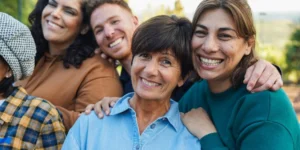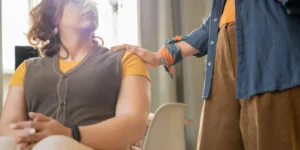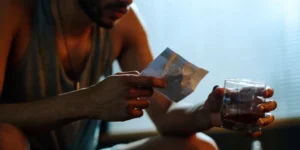Empowerment Through Life Skills Fuels Lasting Recovery Transformation
How can life skills training enhance self-care practices in addiction treatment and contribute to a more holistic approach to healing? Get help from qualified counsellors.
- Private residential rehab clinic
- Full spectrum of treatment.
- Integrated, dual-diagnosis treatment programs.
The Part of Recovery No One Talks About
Here’s the hard truth, getting clean is not the same as getting well. Sobriety without stability is just waiting for the next collapse. Rehab teaches you how to stop using, but it rarely teaches you how to live. The addiction industry loves to celebrate discharge days, tears, hugs, and promises, but the real test starts when the gates close behind you and you’re left facing rent, work, family, and yourself.
In South Africa, we’ve built a system that measures success by abstinence, not by functionality. If you’re sober but still can’t manage your emotions, your finances, or your relationships, you’re not thriving, you’re surviving. And survival mode has an expiry date.
It’s time we talk about what happens after treatment, the part of recovery that determines whether you stay sober or start the slow slide back.
The Rehab Gap: Clean, But Unprepared
Rehab is a controlled environment. You eat when told, sleep when told, attend groups when told. Then you leave and life hits back: unpaid bills, broken relationships, a demanding job, and the loneliness that sits in the corners of every quiet evening.
Most people don’t relapse because they want to use. They relapse because they never learned how to function without chaos. Addiction delayed their development, emotionally, financially, socially. You can detox the body in a week, but rebuilding a life takes structure and skill.
Recovery shouldn’t end at discharge, that’s where it should begin.
Life Skills, The Underrated Weapon Against Relapse
“Life skills” might sound like a buzzword, but they’re the invisible armour that keeps sobriety intact. We’re not talking about fancy self-improvement courses or mindfulness retreats. We’re talking about practical tools, budgeting, communication, self-care, boundaries, and purpose.
These are the muscles addiction atrophies. Without rebuilding them, people return to old environments with the same mental toolkit that failed them before. That’s not relapse, that’s inevitability. When rehabs integrate life skills training, relapse rates drop. Not because people suddenly find willpower, but because they learn how to live.
Self-Care Isn’t Self-Indulgence, It’s Survival
In recovery, “self-care” is often misunderstood. It’s not about scented candles or spa days, it’s about basic maintenance. Addiction strips away the fundamentals, eating properly, sleeping regularly, showering, brushing teeth, showing up for yourself.
Relearning these habits isn’t trivial. Regular meals stabilise blood sugar, which reduces irritability and cravings. Exercise improves mood and sleep. Hygiene routines rebuild a sense of dignity. Think of it as repairing the body’s operating system. You can’t run emotional software on a neglected machine.
Money, The Quiet Relapse Trigger
Few things erode recovery faster than financial chaos. Debt, unemployment, or reckless spending reignite shame and stress, two of addiction’s oldest friends.
For many in recovery, money was either a tool for using or something that disappeared the moment it arrived. Teaching financial management isn’t about becoming rich, it’s about becoming safe. Simple budgeting, managing debt, and saving even small amounts give structure and control, the two things addiction takes away.
In South Africa, where unemployment and financial strain are everyday realities, these skills can mean the difference between relapse and resilience. You can’t meditate your way out of a missed rent payment. You need a plan.
Learning to Speak Without Defending
Addiction wrecks communication. It teaches you to lie, manipulate, or withdraw, survival language for a chaotic world. But recovery demands new language, honesty, vulnerability, and boundary-setting.
Life skills training in communication rebuilds trust. It helps people express needs instead of demands, anger instead of violence, fear instead of denial. These aren’t soft skills, they’re relapse prevention tools.
When you learn to ask for help, you remove one of addiction’s strongest weapons, isolation.
Relationships, Rebuilding Without Repeating
Sobriety shines an unflattering light on your relationships. The codependent partners, the enablers, the toxic friends, they all come into focus. Without guidance, people in early recovery tend to swing to extremes, cutting everyone off or clinging to anyone who feels safe.
Life skills training teaches balance. You learn how to set healthy boundaries without guilt, how to rebuild trust with family slowly, and how to avoid replacing substance addiction with relationship addiction. Because here’s the truth, recovery isn’t just learning not to use, it’s learning not to repeat.
Work, The Forgotten Anchor
Employment gives structure, identity, and self-worth, all things addiction erodes. But many people leaving rehab have been unemployed, dismissed, or out of routine for months or years.
Job readiness training, writing a CV, practising interviews, showing up on time, might sound simple, but it’s the difference between dependence and autonomy. Having somewhere to be each morning isn’t just about money, it’s about belonging. A day with structure is a day less vulnerable to relapse.
In South Africa’s tough job market, these skills can restore dignity. Rehab should prepare people for work, not just sobriety. Otherwise, you release them into the same instability that fuelled their addiction.
Emotional Intelligence, The Real Aftercare
Underneath every relapse sits an unprocessed emotion, anger, shame, grief, fear. If you can’t recognise what you’re feeling, you’ll act it out. Teaching emotional regulation should be central to treatment. People in recovery need to learn how to name their emotions, tolerate discomfort, and self-soothe without substances.
It’s not therapy jargon, it’s damage control. Addiction taught avoidance, recovery demands awareness. And awareness isn’t mystical. It’s practical.
When someone says, “I want to use,” what they often mean is, “I don’t know how to feel this.” Emotional education turns that confusion into choice.
Why Traditional Rehabs Resist This
Most rehabs still treat life skills as “aftercare,” something optional once detox is done. The funding structure is part of the problem, medical aids pay for detox, not for reintegration. Centres are rewarded for short stays, not sustained outcomes.
It’s easier to manage a 28-day clinical program than to teach someone how to live again. But short-term thinking keeps people stuck in the revolving door of treatment.
We don’t measure heart surgery by how good the stitches look on day one. We measure survival six months later. Addiction treatment should be no different.
From Treatment to Transformation
When recovery includes life skills, the goal shifts from abstinence to autonomy. The measure of success becomes not “How long have you been sober?” but “Can you function under pressure?”
People who can manage stress, money, relationships, and self-care are less likely to relapse, not because they’re stronger, but because they’re equipped. Resilience isn’t a personality trait, it’s a skill set.
That’s what life skills training builds, practical resilience.
Recovery as a Societal Upgrade
When you teach one person in recovery how to function, you change more than their life, you change their family, their workplace, their community.
Imagine a country where rehab doesn’t just treat addiction but produces stable, employed, emotionally intelligent citizens. Fewer relapses mean fewer emergency hospitalisations, fewer broken families, fewer children repeating the cycle.
This isn’t idealism, it’s public health. Life skills training isn’t just therapy, it’s prevention.
How to Choose a Rehab That Teaches Living
Before committing to treatment, ask the right questions:
- Do you teach financial and emotional management skills?
- Do families receive boundary and communication training?
- What job readiness or reintegration support do you offer?
- Is aftercare focused on community connection, not just relapse talks?
If a rehab can’t answer these clearly, keep looking. Recovery isn’t about luxury or location, it’s about preparation.
Building a Life You Don’t Need to Escape From
Picture someone leaving treatment with more than clean urine tests, someone who knows how to pay bills, cook dinner, set boundaries, and manage anxiety without a drink. That’s recovery worth celebrating.
Because sobriety isn’t the prize. Functionality is. You don’t stay sober by willpower alone; you stay sober by living a life that makes relapse unnecessary. Real recovery doesn’t look like perfection. It looks like participation.
The New Definition of Recovery
Addiction treatment has spent decades teaching people how to stop dying. It’s time we teach them how to start living.
Because getting sober is hard, but staying human after addiction is harder. And the answer isn’t another detox. It’s life skills, structure, and connection.
That’s what recovery really looks like. And that’s what South Africa needs more of, not just clean lives, but capable ones.

The Lie Families Tell First Most families do not begin with a clear decision, they…

The “Living Hell” Description Isn’t Dramatic People who have never lived with addiction often think…

Drug and alcohol abuse is old Drug and alcohol abuse is not a modern invention…